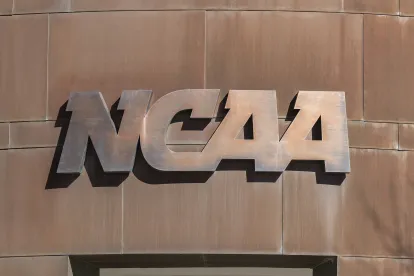Following the U.S. District Court for the Eastern District of Tennessee’s grant of a preliminary injunction in the recent case filed against the NCAA, captioned Tennessee and Virginia v. NCAA, the NCAA has decided to halt investigations into third-party involvement in name, image, and likeness (NIL) compensation deals with Division I college athletes. In granting the injunction, the Court opined that the NCAA’s rules prevent athletes from “obtaining full, fair market value for [their NIL] rights,” and opined that such restrictions were “anticompetitive.”[1]
While the NCAA maintains certain policies regarding NIL compensation, such as prohibiting schools from directly paying athletes or tying compensation to athletic performance, it has opted to pause investigations involving third-party participation, or groups that are commonly known as NIL collectives.[2]
By pausing the enforcement of these rules, collectives are able to negotiate NIL deals with recruits without risk of NCAA investigation at this time. NCAA president Charlie Baker announced the pause on these rules in a memo sent to member schools shortly following the Court’s decision:
In response to this latest order, the Division I Board of Directors directed NCAA enforcement staff to pause and not begin investigations involving third-party participation in NIL-related activities. There will be no penalty for conduct that occurs consistent with the injunction while the injunction is in place. I agree with this decision, while the progress toward long-term solutions is underway and while we await discussions with the attorneys general. In circumstances that are less than ideal, this at least gives the membership notice of the board’s direction related to enforcement.[3]
The pause comes after the NCAA investigated schools like Tennessee and Florida over their collectives’ NIL dealings with recruits.[4] With big-money collectives becoming increasingly influential in recruiting for sports, the NCAA’s previous stance was becoming difficult to enforce consistently.[5] For now, collectives can openly negotiate NIL contracts with incoming recruits and transfers, though the contracts cannot be de facto pay-for-play agreements.
The situation underscores the rapidly changing NIL landscape and the NCAA’s attempt to regulate NIL while dealing with legal challenges. As the Tennessee case continues, the NCAA is taking a hands-off approach to collectives’ NIL activities rather than risk facing judicial roadblocks.
[1] Court Grants TRO in NIL Lawsuit, Squire Patton Boggs, https://www.sports.legal/2024/03/court-grants-tro-in-nil-lawsuit/ (March 4, 2024).
[2] NIL Collectives are organizations or groups that facilitate and manage endorsement deals and sponsorship opportunities for college athletes. These collectives work on behalf of athletes to secure compensation for the use of their name, image, and likeness in various commercial ventures. Though typically tied to and associated with particular NCAA-affiliated schools, these collectives are not officially tied to any school – hence their reference as third parties.
[3] Charlie Baker Halts NCAA’s NIL Investigations Following Preliminary Injunction in Tennessee, On3NIL, https://www.on3.com/nil/news/ncaa-issues-updated-nil-guidance-after-preliminary-injunction-decision/ (March 1, 2024).
[4] NCAA Pausing NIL Investigations in Wake of Tennessee Case, ESPN, https://www.espn.com/college-football/story/_/id/39633142/ncaa-pausing-nil-investigations-wake-tennessee-case (March 1, 2024).
[5] Id.






 />i
/>i

